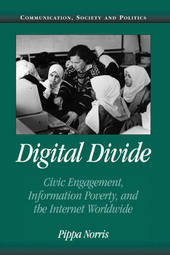
|
Digital Divide: Civic Engagement, Information Poverty, and the Internet Worldwide
Hardback
Main Details
| Title |
Digital Divide: Civic Engagement, Information Poverty, and the Internet Worldwide
|
| Authors and Contributors |
By (author) Pippa Norris
|
| Series | Communication, Society and Politics |
|---|
| Physical Properties |
| Format:Hardback | | Pages:320 | | Dimensions(mm): Height 229,Width 152 |
|
| Category/Genre | Political economy
Impact of science and technology on society
Internet guides and online services |
|---|
| ISBN/Barcode |
9780521807517
|
| Classifications | Dewey:303.4833 |
|---|
| Audience | | Professional & Vocational | | Tertiary Education (US: College) | |
|---|
| Illustrations |
42 Tables, unspecified; 2 Maps; 20 Halftones, unspecified; 17 Line drawings, unspecified
|
|
Publishing Details |
| Publisher |
Cambridge University Press
|
| Imprint |
Cambridge University Press
|
| Publication Date |
24 September 2001 |
| Publication Country |
United Kingdom
|
Description
There is widespread concern that the growth of the Internet is exacerbating inequalities between the information rich and poor. Digital Divide examines access and use of the Internet in 179 nations world-wide. A global divide is evident between industrialized and developing societies. A social divide is apparent between rich and poor within each nation. Within the online community, evidence for a democratic divide is emerging between those who do and do not use Internet resources to engage and participate in public life. Part I outlines the theoretical debate between cyber-optimists who see the Internet as the great leveler. Part II examines the virtual political system and the way that representative institutions have responded to new opportunities on the Internet. Part III analyzes how the public has responded to these opportunities in Europe and the United States and develops the civic engagement model to explain patterns of participation via the Internet.
Reviews'Norris's worldwide comparison of 179 countries' national and political context of Internet access and use is a valuable contribution to our understanding of the problem of the digital divide because it blends together the economic aspect with socioeconomic and democratic development with a systematic framework.' Prometheus
|